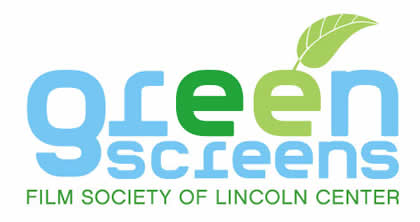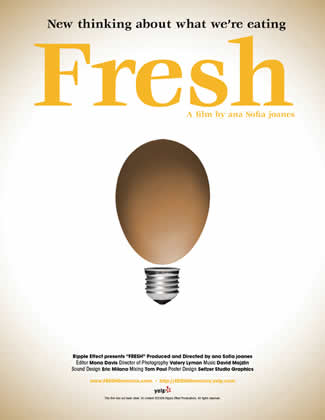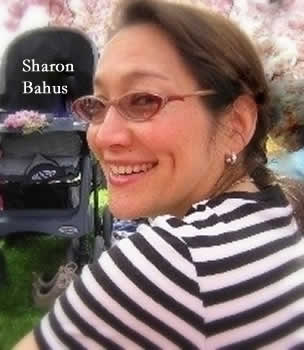 In 2007, the FILM SOCIETY OF LINCOLN CENTER started a new ongoing film series called GREEN SCREENS in order to increase awareness about climate change and global warming, and to draw attention to possible solutions. Due to voluntary efforts by Film Society staffers Isa Cucinotta, Marian Masone and Sharon Bahus, GREEN SCREENS has since established itself as a successful addition to the Society’s monthly program. Cinema Without Borders spoke with former curator Sharon Bahus to learn more about this innovative, informative, and inspiring screening series.
In 2007, the FILM SOCIETY OF LINCOLN CENTER started a new ongoing film series called GREEN SCREENS in order to increase awareness about climate change and global warming, and to draw attention to possible solutions. Due to voluntary efforts by Film Society staffers Isa Cucinotta, Marian Masone and Sharon Bahus, GREEN SCREENS has since established itself as a successful addition to the Society’s monthly program. Cinema Without Borders spoke with former curator Sharon Bahus to learn more about this innovative, informative, and inspiring screening series.
CWB: How did it all get started?
Sharon Bahus: I realized the need of taking action after witnessing—firsthand—the melting of the glaciers while flying from Helsinki to New York. The landmass we flew over was southern Greenland, and I learned that if Greenland’s glaciers melted entirely, sea levels could rise 23 feet! A sobering thought considering NYC, the place I call home, is surrounded by water…That visual set my hair on fire and led me to change my consumption habits and harangue friends and family to do the same. I discovered how oblivious most of us are regarding the sources and impacts of our energy use, transportation, food and shelter and their contributions to environmental degradation and climate change. After viewing An Inconvenient Truth, I was convinced that entertaining film media could affect massive behavioral change to combat global warming. As the rental manager of The Walter Reade Theater, I realized that the Film Society had a wonderful opportunity to spearhead this urgent message to our public considering the enormous impact climate change will have on New York City and its residents.
When I saw Environmental Defense’s Public Service Announcement Train, regarding climate change, I imagined how much more impact that Train could have leaping off of our 19’x35′ screen! I liked the idea of using public service announcements to appeal to our higher instincts like the newsreels, shorts to sell savings bonds, or requests to save metal and “Loose Lips Sink Ships” messages deployed during wartime in movie theaters.
CWB: How did the idea for GREEN SCREENS come upon?
Sharon Bahus:. The idea for Green Screens emerged after our Public Service Announcement (PSA) program launched in 2007 at the Film Society of Lincoln Center’s Walter Reade Theater in NYC. The PSA’s were announced at an HD simulcast of the first “Live Earth”  concert to correspond with Al Gore & Kevin Wall’s concept to harness the power of entertainment and media to spread global awareness of climate change. The PSA program was meant to be a daily in-your-face reminder of the powerful effects of climate change and to direct audiences to websites to learn more. The GREEN SCREENS component, through its longer film & discussion format, could explore in-depth issues of global warming, the safety of our food supply, and sustainable living. Our ultimate goal was to raise the consciousness and empower our audience to make necessary changes in their everyday lives.
concert to correspond with Al Gore & Kevin Wall’s concept to harness the power of entertainment and media to spread global awareness of climate change. The PSA program was meant to be a daily in-your-face reminder of the powerful effects of climate change and to direct audiences to websites to learn more. The GREEN SCREENS component, through its longer film & discussion format, could explore in-depth issues of global warming, the safety of our food supply, and sustainable living. Our ultimate goal was to raise the consciousness and empower our audience to make necessary changes in their everyday lives.
CWB: Was it difficult to convince the Film Society to agree to it?
Sharon Bahus: Former Executive Director Claudia Bonn and Director of Programming Richard Pena were extremely supportive of the program, especially following the Inconvenient Truth’s Oscar. Unfortunately, it became difficult to ‘grow the program’ as the Film Society underwent enormous upheaval due to a change in board leadership, our capital expansion, the resignation of our Executive Director and the search for new leadership. The Board demanded PSA’s end a year after we began the program, believing a tabula rasa prior to screenings was more agreeable than climate change messages to our public. We had hoped new leadership would respond favorably to environmental concerns but, unfortunately, this was not the case.
CWB: What kind of films do you screen?
Sharon Bahus: During my tenure as a Green Screen co-curator, we screened 10 films.
We launched the series with Leonardo DiCaprio’s The 11th Hour (dir. Leila Conners Petersen and Nadia Conners) and screened mainly documentaries including the following:
Red Gold (dir.Travis Rummel & Ben Knight) about the mining impacts on wild salmon,
Flow (dir.Irina Silena)- on privatization of water,
Biutiful Cauntri (dir.Esmeralda Calabria & Andrea D’Ambrosio) about ravages of toxic dumping
Scarred Lands, Wounded Lives (dir.Alice & Lincoln Day): focusing on war’s impact on the environment
Fuel (dir.Josh Tickell): on biodiesels
Mountaintop Removal (dir.Michael O’Connor) about the destructive method of coal extraction and its impacts on Appalachian families in West Virginia.
Garbage Warrior (dir.Oliver Hodge) on sustainable housing, etc.
HomeGrown (dir. Robert McFalls) & ) Farming the Future: Farm Life on Long Island (dir. Robert Rudaitis) about urban farming options and issues.
We also screened Nausicaa, by Hiyao Miyazaki. An environmental animation, with an environmental fair for children including, eco book sales, worm composting and water conservation games.
 CWB: How do you research and find films for the series?
CWB: How do you research and find films for the series?
Sharon Bahus: Fortunately, producers and filmmakers attracted to the name and location of “Film Society at Lincoln Center” often contacted us to screen their films. When others learned of our series, people involved with films would tip us off of imminent movies in the making. That was how we obtained the film Fuel and Red Gold. Frequently, we decided an area we wanted to highlight and searched for films in this vein through word of mouth, the web, environmental festival listings, blogs, etc.
CWB: In addition to the screenings, you also invite local non-profits to discuss their activities with the audience. How did that idea come about?
Sharon Bahus: Most environmental documentaries carry bleak messages. So from the inception of Green Screens, we determined to make this program relevant by directing audience outrage and sorrow into action. I was very much influenced by the Media that Matters model; pairing short films on various social issues with online links to organizations where more information and opportunities to become activist could be gained. We also realized that environmental threats perceived “over HERE” rather than “over THERE” could galvanize an audience with much more urgency, so we sought to tie local issues to those featured in the films providing immediacy and the universality of the issues.
Including filmmakers along with local and regional experts in our Q&A’s could provide context with corresponding local issues. We wanted to amplify efforts of the many wonderful organizations on the ground and compel our audience to plug-in and push forward with them to make changes on local, state and federal levels whether through voting for environmental candidates, petitioning businesses & organizations to switch to sustainable alternatives, purchasing ‘greener’ products, etc.
We were also contacted by some organizations to table at our screenings.
CWB: Besides curating and producing the film series, what other sustainability initiatives did you start at the Film Society?
Sharon Bahus: Believing it is necessary for individuals AND organizations to do their part, we began to green our operations by asking employees in each department what measures they could take to reduce their carbon footprint. We received positive responses from most of the staff, however, there was definitely more of a sense of urgency from younger staffers. We reduced paper usage by approximately 40% through recycling, double sided usage and electronic mail. NY Film Festival began distributing paperless press releases on CD.
Some of our efforts included using a printer which printed our postcards on recycled paper with soy based inks, raising thermostats to 78 degrees, and greening our receptions & concession stands with bio based disposables.
CWB: What was easy and what was difficult?
Sharon Bahus: In the Film Society (FS) microcosm, reasons such as greater cost of recycled products & fears of lost revenue echoed roadblocks preventing most organizations from switching to sustainable solutions: It was easy to get FS staff on board to conserve paper; It was difficult to persuade management to apply savings—through decreased consumption— and to purchase 100% recycled paper. We eventually compromised with 30% recycled paper. Ending sales of bottled water at the concession stand was met with resistance by our concession manager due to fears of lost revenue. Filtered water options were referred to the house manager and hopefully have been instituted since my layoff in February. What was difficult was trying, unsuccessfully, to reach new audiences through paperless marketing and having our e-postcards overlooked or deleted. Much of our print promotion was made independently by myself and the Director of Programming Operations due to lack of time and budget in our art department.
CWB: Anything else you would like to mention?
Sharon Bahus: What I’ve learned is that visionary leadership is essential to advancing sustainable solutions within the urgent time frame that the climate change crisis imposes on us. Arts organizations such as the Victory Theater, BAM, Joseph Urban Center and the Brooklyn Children Museum moved forward with construction and renovation projects and made environmental considerations a priority; environmental issues were, unfortunately, not a consideration during the planning of the Elinor Bunin Film Center and renovations to the Walter Reade Theater. The Film Society missed a great opportunity to assume a leadership position, setting an example to inspire other cultural organizations.
CWB: So what’s next for you, Sharon?
Sharon Bahus: After witnessing the impact an environmental leader can make in drastically reducing our carbon footprint, I am hoping to become one. I have applied and been accepted into the Marlboro MBA in Managing for Sustainability program starting in January. An exciting prospect!
CWB: Congratulations, Sharon – and all the best for you!
Next, GREEN SCREENS will screen Ana Joanes documentary FRESH on October 27 at 6.30 pm at the Walter Reade Theater in NYC
For more information, please visit www.filmlinc.com/wrt/gs/index.html

